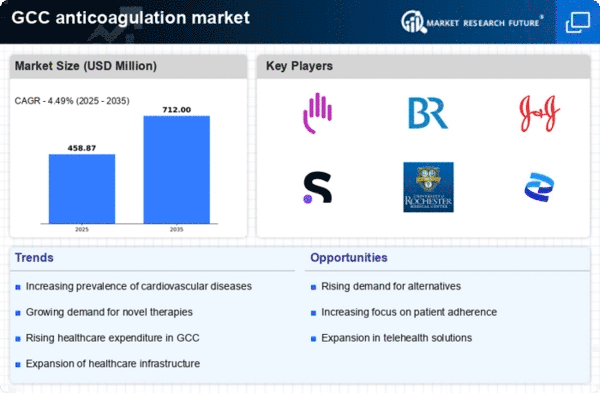Increasing Aging Population
The aging population in the GCC region is a crucial driver for the anticoagulation market. As individuals age, the risk of developing conditions such as atrial fibrillation and venous thromboembolism increases significantly. According to recent statistics, approximately 12% of the population in the GCC is aged 60 and above, a demographic that is expected to grow. This demographic shift is likely to lead to a higher demand for anticoagulant therapies, as older adults are more prone to cardiovascular diseases. Consequently, healthcare providers are focusing on developing tailored anticoagulation strategies to manage these conditions effectively. The increasing aging population thus presents a substantial opportunity for growth within the anticoagulation market, as pharmaceutical companies and healthcare systems adapt to meet the needs of this demographic.
Rising Healthcare Expenditure
Healthcare expenditure in the GCC countries has been on the rise, which is likely to impact the anticoagulation market positively. Governments are investing heavily in healthcare infrastructure and services, with spending projected to reach $100 billion by 2025. This increase in funding allows for better access to advanced medical treatments, including anticoagulants. As healthcare systems evolve, there is a growing emphasis on preventive care and chronic disease management, which includes the use of anticoagulants for patients at risk of thromboembolic events. The rising healthcare expenditure not only enhances the availability of anticoagulant therapies but also encourages research and development in this field, potentially leading to innovative treatment options that could further drive market growth.
Growing Awareness of Thrombosis
There is a notable increase in awareness regarding thrombosis and its associated risks within the GCC region. Educational campaigns and initiatives by healthcare organizations are helping to inform both healthcare professionals and the public about the importance of anticoagulation therapy. This heightened awareness is likely to lead to earlier diagnosis and treatment of conditions requiring anticoagulants, thereby expanding the patient base for the anticoagulation market. Furthermore, as patients become more informed about their health, they may actively seek out anticoagulant therapies, contributing to market growth. The focus on thrombosis awareness is expected to continue, potentially resulting in a more proactive approach to managing thromboembolic disorders.
Expansion of Generic Anticoagulants
The introduction and expansion of generic anticoagulants in the GCC market is anticipated to drive competition and accessibility within the anticoagulation market. As patents for several branded anticoagulants expire, generic alternatives are becoming available at lower prices, making these therapies more accessible to a broader patient population. This shift is particularly important in the GCC, where healthcare costs are a significant concern for many patients. The availability of affordable generic options is likely to increase the adoption of anticoagulant therapies, thereby expanding the overall market. Additionally, the presence of generics may encourage innovation among pharmaceutical companies, as they strive to differentiate their products in a competitive landscape.
Regulatory Support for Anticoagulant Therapies
Regulatory bodies in the GCC region are increasingly supportive of anticoagulant therapies, which is likely to foster growth in the anticoagulation market. Streamlined approval processes and favorable regulations for new anticoagulant drugs are encouraging pharmaceutical companies to invest in research and development. This regulatory environment not only facilitates the introduction of innovative therapies but also enhances the safety and efficacy of existing treatments. As regulatory support continues to strengthen, it is expected that more anticoagulant products will enter the market, providing healthcare providers with a wider array of options to manage thromboembolic disorders effectively. This supportive regulatory framework is crucial for the ongoing evolution of the anticoagulation market.
















